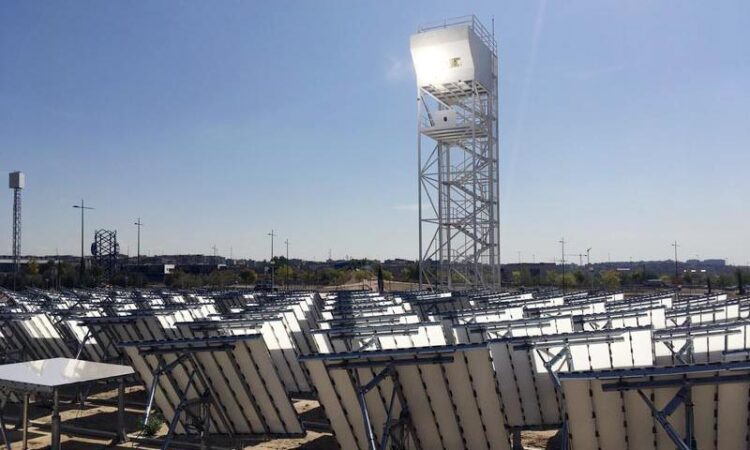A next step towards climate-friendly fuels

Der Solarturm vom Forschungszentrum IMDEA Energy in Móstoles, Madrid: Das Spiegelfeld konzentriert Sonnenlicht auf die Spitze des Solarturms, wo die erzeugte Solarwärme für die Herstellung von synthetischen Treibstoffen genutzt wird.
Bild: Synhelion
Synhelion and Empa are conducting a joint research project, co-funded by the Swiss Innovation Agency Innosuisse, to further develop a high-temperature energy storage solution that is a key component in the production of climate-friendly solar fuels. The project will enable the cost-effective and scalable storage of high-temperature solar heat at over 1’000°C for the first time. The storage technology is expected to be used in Synhelion’s first industrial-scale solar fuel production facility, which will be built in 2022.
Synhelion produces sustainable fuels such as gasoline, diesel and kerosene that are compatible with conventional internal combustion engines and jet engines. In order to produce these synthetic fuels the ETH Zurich spin-off has developed a solar thermochemical process based on process heat generated from concentrated sunlight. To enable the chemical reactors for solar fuel production to operate around the clock, a cost-effective, high-temperature thermal energy storage (TES) is needed. This solution stores part of the solar energy to be used during the night and during cloudy periods, enabling continuous operation of the reactors, thereby significantly increasing plant capacity and drastically reducing capital expenditure.
Currently, there is no TES on the market that is compatible with the high temperatures, cycle times, and heat transfer fluid of Synhelion’s technology. Therefore, Synhelion is further developing the solid heat storage technology itself, enabling the storage of high-temperature solar heat of over 1’000°C in a cost-effective and scalable manner for the first time. As part of the research project with Empa, which is being co-funded by Innosuisse, storage and insulation capabilities will be optimized in terms of material costs, high specific heat capacity, and service life. Additionally, a design for the world’s first industrial-scale solar fuel plant, to be built by Synhelion in 2022, is being developed.
Lukas Geissbühler, Head Thermal Systems at Synhelion, commented: “Thermal energy storage is much cheaper and more environmentally friendly than battery storage. The further development of our TES solution is crucial for the cost-effective and continuous production of synthetic fuels. With our solar fuels, we can make an important contribution to combating the climate crisis.”
Thomas Graule, Head of Empa’s Laboratory for High Performance Ceramics, added: “This research project builds on numerous Swiss cleantech innovations of recent years. Our expertise in developing and using technical ceramics under extreme temperature and corrosion conditions is creating added value for Swiss industry.” Affordable and technologically advanced TES materials will be developed and characterized by Empa researcher Gurdial Blugan and his team in partnership with Synhelion.
Wissenschaftliche Ansprechpartner:
Prof. Dr. Thomas Graule
Empa, Laboratory for High-Performance Ceramics
Phone +41 58 765 41 23
thomas.graule@empa.ch
Editor / Media contact
Carmen Murer
Synhelion, Head Corporate Communication
Phone +41 79 619 52 11
carmen.murer@synhelion.com
Dr. Michael Hagmann
Empa, Communication
Phone +41 58 765 45 92
redaktion@empa.ch
Weitere Informationen:
Media Contact
All latest news from the category: Power and Electrical Engineering
This topic covers issues related to energy generation, conversion, transportation and consumption and how the industry is addressing the challenge of energy efficiency in general.
innovations-report provides in-depth and informative reports and articles on subjects ranging from wind energy, fuel cell technology, solar energy, geothermal energy, petroleum, gas, nuclear engineering, alternative energy and energy efficiency to fusion, hydrogen and superconductor technologies.
Newest articles

First-of-its-kind study uses remote sensing to monitor plastic debris in rivers and lakes
Remote sensing creates a cost-effective solution to monitoring plastic pollution. A first-of-its-kind study from researchers at the University of Minnesota Twin Cities shows how remote sensing can help monitor and…

Laser-based artificial neuron mimics nerve cell functions at lightning speed
With a processing speed a billion times faster than nature, chip-based laser neuron could help advance AI tasks such as pattern recognition and sequence prediction. Researchers have developed a laser-based…

Optimising the processing of plastic waste
Just one look in the yellow bin reveals a colourful jumble of different types of plastic. However, the purer and more uniform plastic waste is, the easier it is to…



